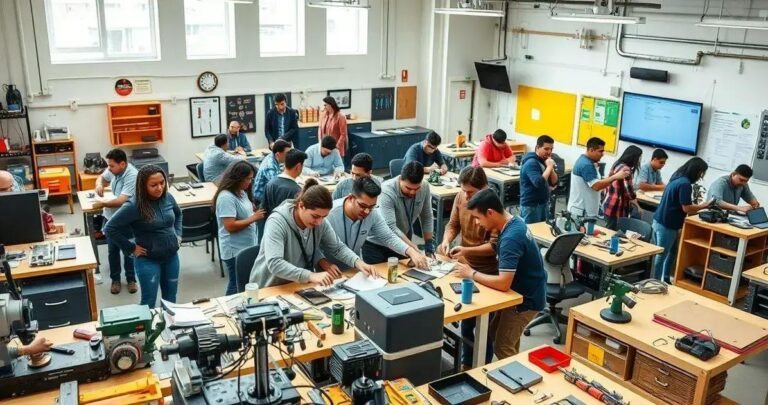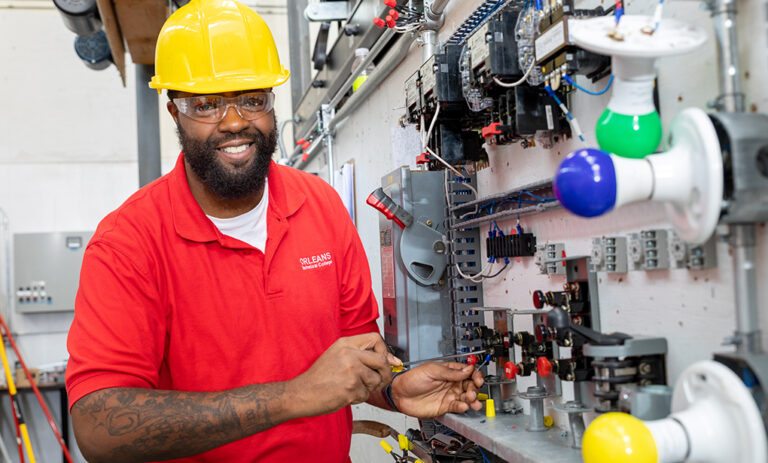Career in Skilled Trades: Unlock Lucrative Opportunities in the Modern Economy
Anúncios
Career in Skilled Trades is becoming an increasingly attractive option in today’s dynamic job market. With industries like construction, manufacturing, and technology evolving rapidly, skilled trades offer a vast array of opportunities. This article explores the various aspects of a career in skilled trades, from essential skills and training to potential growth paths. Whether you’re a young starting professional or looking to switch careers, here’s why pursuing a skilled trade could be your best move.
Exploring the Diverse World of Skilled Trades Careers
The world of skilled trades is exceptionally diverse, offering a mosaic of career paths that cater to various interests and talents. From electricians to plumbers, these professions offer hands-on work that is both fulfilling and essential. Each trade has its unique set of skills, standards, and practices, ensuring that there is something for everyone.
Trades Across Different Sectors
Skilled trades span across sectors such as construction, manufacturing, and automotive industries. Construction trades might include carpenters, masons, and heavy machinery operators, each playing a vital role in building infrastructure. In manufacturing, welders and machinists are critical for creating products we use daily. Automotive service technicians keep the world moving by ensuring vehicles run smoothly.
Exploring Opportunities
Many trades offer an opportunity for specialization and career advancement. For example, a licensed electrician can choose to specialize in residential, commercial, or industrial work. Similarly, HVAC technicians have the option to focus on installation, maintenance, or repair. Apprenticeships and vocational programs are excellent starting points, offering practical experience that leads to certification.
Another significant advantage of skilled trades is the job security they offer. As society evolves, there’s an ever-growing demand for skilled workers in various trades. This demand translates into stable job opportunities and competitive wages. Furthermore, with advancements in technology, tradespeople need to continuously update their skills, making lifelong learning an integral part of their careers.
Why Skilled Trades are Essential in Today’s Economy

Skilled trades serve as the backbone of modern economies, providing necessary services and infrastructure required for daily operations. With growing urbanization and technological advancement, skilled tradespeople are indispensable in maintaining and developing cities and industries. They ensure our homes, vehicles, and workplaces are safe and functional.
Addressing Labor Shortages
As industries expand, there’s an increasing demand for skilled labor, creating numerous job openings. These trades fill vital roles that automation cannot replace, highlighting the need for skilled human expertise. This demand not only stabilizes the workforce but also contributes to economic growth by filling essential gaps in the labor market.
Driving Economic Growth
Economic development heavily relies on infrastructure, which skilled trades help build and maintain. Electricians, carpenters, and plumbers, among others, contribute to sectors like residential construction and industrial development. Their work supports the foundation of industries, paving the way for new projects and innovations.
Furthermore, skilled trades promote local economies by supporting small businesses and suppliers. These trades often involve locally-sourced materials and services, contributing to a self-sustaining economic cycle. As these businesses flourish, they provide more opportunities for community employment and development.
How to Start Your Career in Skilled Trades
Starting a career in skilled trades opens doors to stable and rewarding work. One of the first steps is identifying the trade that aligns with your interests and skills. Researching various trades, such as welding, electrical work, or plumbing, can help you find your niche. This choice lays the foundation for your future specialization and growth.
Education and Training
Most trades require formal education and training. Vocational schools and community colleges offer programs that combine classroom learning with hands-on experience. Enrolling in a certification program ensures you gain the necessary skills and knowledge. Many programs also offer apprenticeships, providing real-world experience under the guidance of experienced professionals.
Apprenticeships
Apprenticeships are essential for learning the intricacies of a trade. They offer paid work while you learn, allowing you to earn as you develop vital skills. These programs often lead to certifications required by many employers. Networking during your apprenticeship can also open up future job opportunities.
Once trained, obtaining a license or certification depending on your chosen field is crucial. This step validates your skills and qualifies you for positions that require certain credentials. Staying updated with new technologies and methods in your trade keeps your skills relevant and in demand.
Skills and Training Required for a Successful Trade Career

A successful trade career hinges on acquiring the right blend of skills and training. Technical skills are fundamental—these include knowing how to use tools and machinery specific to your trade. Programs at vocational schools or technical institutions typically start with foundational skills and build up to advanced topics.
Technical Skills and Hands-On Experience
Hands-on experience forms the backbone of skilled trades. While classroom learning is crucial, applying that knowledge in real-life scenarios helps solidify your skills. Apprenticeships offer a platform where theory meets practice, enabling you to learn from seasoned professionals.
Soft Skills for Tradespeople
Besides technical prowess, soft skills are equally essential. Communication, problem-solving, and teamwork are vital in executing projects successfully. Whether working with a crew or discussing plans with clients, these skills ensure smooth operations and client satisfaction.
Training remains an ongoing process. As industries evolve with technology, staying updated is crucial. Continuous professional development through workshops and courses keeps you at the cutting edge of your field. This commitment to learning makes you a valuable asset in the workforce, enhancing both your career prospects and potential earnings.
The Future of Skilled Trades: Opportunities and Challenges
The future of skilled trades is bright with abundant opportunities spurred by technological advancements and infrastructure growth. As industries such as renewable energy and sustainable construction expand, they pave the way for new roles for skilled tradespeople. Electricians, plumbers, and carpenters will find increasing demand as eco-friendly solutions become more mainstream.
Technological Integration
Modern technology is reshaping how trades operate. Embracing tools like 3D printing and digital modeling enhances precision and efficiency. Tradespeople who adapt to these tools will have a competitive edge, driving innovation within their fields. Continuous learning is vital as technology evolves.
Challenges in the Trades
Despite vast opportunities, challenges persist. One of the main hurdles is the aging workforce. As seasoned professionals retire, the industry faces a skills gap that needs urgent attention. Encouraging younger generations to enter trades through education and awareness can help bridge this gap.
Additionally, safety and regulation changes require ongoing adaptation. Staying informed about industry standards ensures compliance and safe working environments. Balancing these demands with evolving client needs and environmental considerations makes trades both challenging and rewarding.
Comparing Skilled Trades to Traditional Professions

When comparing skilled trades to traditional professions, both offer unique advantages and challenges. Skilled trades typically involve hands-on work with tangible outcomes, providing immediate job satisfaction. These careers often require less educational debt as they focus on vocational training rather than lengthy degrees.
Education and Entry Requirements
Traditional professions often demand four-year degrees or more, leading to significant student debt. In contrast, trades offer faster entry into the workforce through apprenticeships and certifications. This means skilled tradespeople can start earning sooner while avoiding high tuition costs.
Income and Job Security
Income potential in both sectors can be substantial. Skilled trades offer competitive wages, often higher than some entry-level positions in traditional fields. With an ongoing demand for trades, job security is strong. Traditional careers may offer higher salaries at advanced levels, yet they often require long-term educational commitments.
Another consideration is work environment. Trades involve physical work and varying locations, perfect for those who prefer an active lifestyle. Traditional jobs may offer office settings with regular hours, appealing to those who seek a stable routine.
Unlocking the Benefits of a Career in Skilled Trades
Choosing a career in skilled trades offers numerous advantages in today’s dynamic economy. With diverse opportunities and robust job security, these professions are crucial for both individual career growth and economic development. Skilled trades provide not only the satisfaction of hands-on work but also the chance to enter the workforce with minimal debt and strong earning potential.
As industries evolve, tradespeople must embrace technological advancements and continuous learning to remain competitive. With new challenges come fresh opportunities for those equipped with the skills and training to adapt. Encouraging more individuals to explore skilled trades can bridge the current skills gap and ensure the vitality of this essential sector.
The future of skilled trades is bright, offering a pathway to a stable and rewarding profession that is integral to our modern world. Whether you’re starting your career or considering a change, the skilled trades present a viable and lucrative avenue for success.
FAQ – Frequently Asked Questions about Careers in Skilled Trades
What are the benefits of pursuing a career in skilled trades?
Skilled trades offer job security, competitive wages, and hands-on work, often with less student debt due to shorter training programs.
How do I start a career in skilled trades?
Begin by selecting a trade that interests you, then enroll in vocational training or an apprenticeship to gain necessary skills.
Are skilled trades professions in demand?
Yes, industries like construction and manufacturing have high demand for skilled tradespeople due to ongoing development and retiring workers.
What are the educational requirements for skilled trades?
Typically, skilled trades require vocational training or apprenticeships rather than traditional college degrees, allowing quicker workforce entry.
How do skilled trades compare to traditional professions?
Skilled trades focus on hands-on work and offer early earning potential, whereas traditional professions may require longer education but can offer different career trajectories.
Is there future growth potential in skilled trades?
Yes, as technology and sustainable projects advance, skilled tradespeople will find new opportunities and roles adapting to industry changes.






